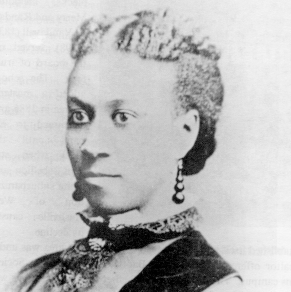 Ella Sheppard
was born on February 4, 1851, in Nashville, Tennessee. Her father Simon
Sheppard hired his time from his master and worked hard to accumulate $1,800
to buy his freedom. Ella's mother, Sarah Hannah Sheppard, was not as fortunate.
Her mistress promised Simon that he could buy Sarah, but the slaveowner
refused to honor the agreement. Determined that Ella would not remain a
slave, Sarah made a threat to "take Ella and jump into the river than
see her a slave." Fearing the loss of mother and child, the slave
mistress sold Ella to Simon Sheppard for $350.
Ella Sheppard
was born on February 4, 1851, in Nashville, Tennessee. Her father Simon
Sheppard hired his time from his master and worked hard to accumulate $1,800
to buy his freedom. Ella's mother, Sarah Hannah Sheppard, was not as fortunate.
Her mistress promised Simon that he could buy Sarah, but the slaveowner
refused to honor the agreement. Determined that Ella would not remain a
slave, Sarah made a threat to "take Ella and jump into the river than
see her a slave." Fearing the loss of mother and child, the slave
mistress sold Ella to Simon Sheppard for $350.
Ella remained in Nashville with her father when the mother was taken to Mississippi. Simon married another slave woman and gave $1,300 for her freedom. A race riot hit Nashville in 1856, causing whites to tighten the controls on local free Negroes. When his business debts piled up and could not be paid, Simon fled to Cincinnati, Ohio, to prevent his family from being seized as assets and sold as slaves. Ella Sheppard attended a colored school and studied music in Cincinnati. Ella demonstrated such exceptional musical talent that her father bought a piano and paid for private music lessons.
Simon Sheppard died in 1866. His bills were paid, leaving Ella and her stepmother penniless. To help support the family, young Ella played the piano at local functions. A prominent local piano teacher agreed to help Ella continue her musical education. She became this man's only black pupil, and Ella had to keep the lessons a secret by entering the school through the back door between nine and ten o'clock at night.
Ella Sheppard returned to Tennessee. In l868, she accepted a teaching position at Gallatin, north of Nashville. The poor Negro students paid tuition so seldom that she saved only six dollars after five months of work. Ella took this six dollars from her "pie box" (trunk) and entered Fisk University, where her six dollars lasted three weeks. By teaching music in Nashville, she earned enough money to continue in school for two years. Ella became the music teacher at Fisk University--the only black staff member at the school before 1875.
Again, good fortune smiled on Ella Sheppard. To relieve the school's serious financial deficiency, Fisk's treasurer, George L. White, organized a group of students to sing for money. The first excursions became so promising that Erastus M. Cravath reluctantly gave White permission to form a group and go on national tour. Cravath was field secretary for the American Missionary Association, Fisk's founding and funding agency, and he was White's brother-in-law. Ella Sheppard became one of nine singers selected by White to form the group of singers. She served as pianist and assistant trainer. Principal Spence became so upset about losing his only music teacher that he asked Cravath to hire another black teacher to serve during Ella's absence "lest the students rebel."
On October 6, 1871, the group went on tour. The first tour netted $20,000 to pay for the site of a new campus at Salem (Eighteenth Avenue, North) and Jefferson Street. As majestic Jubilee Hall slowly rose on the site and the school needed more funds, the Jubilee Fund often became the only source of money for the school. So the singers had to extend their concert tours. In seven years, the Jubilee Singers raised $150,000 in America and Europe. Ella Sheppard served as the backbone and trainer for the group.
In 1882, Ella Sheppard married George W. Moore. She spent many years helping George in his work with the American Missionary Association, lecturing throughout the South, and organizing Jubilee choirs. Eventually, she located her mother and a sister in Mississippi and brought them to Nashville.
Ella Sheppard died on June 9, 1914. She was interred in Nashville's Old City Cemetery.